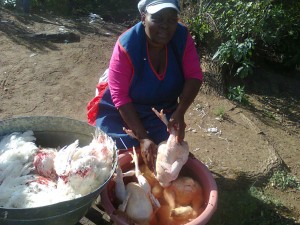About LED
Social Protection and Local Economic Development (LED): Graduation Pilot Programme
On the 30th of October 2013, SPII launched the ‘Social Protection and Local Economic Development (LED): Graduation Pilot Project’ in Evaton Township, south of Johannesburg. The pilot programme seeks to link the child support grant (CSG) and Local Economic Development (LED) by targeting small, micro and survivalist enterprises in the informal economy that have a recipient of the CSG within the household. In South Africa, the social grant system forms one pillar of the state’s social security system, with social insurance constituting another critical pillar. Social security, including social assistance, is a justiciable socio-economic Constitutional right contained in Section 27 of the South African Constitution. Social assistance forms an important component of the social protection package or social wage, delivered by the state. International examples of social protection schemes from countries such as Mexico, Brazil and India indicate that these cash transfers provide more than relief for hunger and suffering and can be the catalyst for local economic development. As a result, cash transfers have come to be seen as a key springboard for the economic growth of poor communities.
T he pilot project is building on the successes of the graduation model internationally. The term ‘graduation’ was coined by the Bangladesh Rural Advancement (BRAC) and has come to represent an innovative and direct approach for addressing extreme poverty. The graduation model focuses on carefully sequenced safety nets, livelihood strategies and access to finance. This study is undertaken in order to generate primary evidence for national scale-up. The project is implemented as a rigorous study with a control and treatment group. Project participants are randomly selected using the above mentioned criteria, which include small, micro and survivalist enterprise owner with a CSG recipient in the household.
he pilot project is building on the successes of the graduation model internationally. The term ‘graduation’ was coined by the Bangladesh Rural Advancement (BRAC) and has come to represent an innovative and direct approach for addressing extreme poverty. The graduation model focuses on carefully sequenced safety nets, livelihood strategies and access to finance. This study is undertaken in order to generate primary evidence for national scale-up. The project is implemented as a rigorous study with a control and treatment group. Project participants are randomly selected using the above mentioned criteria, which include small, micro and survivalist enterprise owner with a CSG recipient in the household.
From a baseline survey of 300, each group was randomly assigned to one of the two groups:
TREATMENT GROUP: Project participants receive interventions such as training in life skills, basic business management skills, financial literacy, matched savings incentive scheme and weekly mentoring from trained fieldworkers (known as enterprise coaches) over a period of 24 months.
CONTROL GROUP: Do not receive any interventions.
In this pilot programme, graduation means to move vulnerable households who are currently receiving a CSG and operate a small, micro and survivalist enterprise through sequenced interventions that are targeted at an enterprise level, so that households are less reliant on the grant as a primary and reliable source of income. Therefore, graduation in this pilot programme means to be become less vulnerable through strengthened or improved livelihood strategies. The threshold for household graduation would be if the household income generated from the enterprise exceeds the CSG means test. Due to means-tested targeting of the state’s CSG, this grant is the selected as a proxy indicator of household vulnerability.











